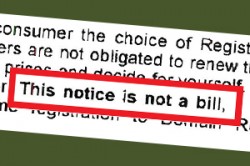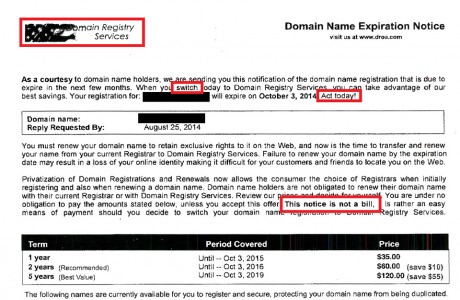
Have you received an bill from an unfamiliar company urging you to renew your domain name? These notices are a scam designed to trick you into paying for unnecessary services or giving out your credit card number. “Domain Registry Services” and “Domain Registry of America (DRoA)” are a few of the companies that are known for sending these false notices.
Things to Look for in a Fake Domain Expiration Notice
- Uses the logo and name of a company that isn’t your hosting provider.
- Directs you to a website that’s not your hosting provider’s official site.
- Mentions switching your domain to a different company or getting a discounted rate.
- Uses extreme speech such as “URGENT!” or “Act Today!” that encourages you to pay as soon as possible.
- Includes “this notice is not a bill” or other phrases indicating that payment isn’t mandatory.
- Addresses you by a generic title such as “Domain Owner” instead of your real name.
- Asks for information your hosting provider already has, such as your credit card number.
If you’re still not sure, contact your hosting company to find out the real status of your domain.
Keep Your Contact Information Secure
Once you’ve identified a fraudulent domain notice, all you need to do is ignore it. But there are several steps you can take to prevent confusion in the future and protect your contact information.
- Ask your hosting company if they offer automatic domain renewal. This will bill your account automatically when your domain expires, so you’ll know for sure that any message asking for more money is a scam.
- Sign up for “private registration” through your hosting company. For a small fee, this will hide your contact information from publicly accessible sites like Whois and make it more difficult for spammers to contact you.
- Download Web of Trust (WOT) a free browser plugin that blocks websites containing scams, malware, or untrustworthy content.

